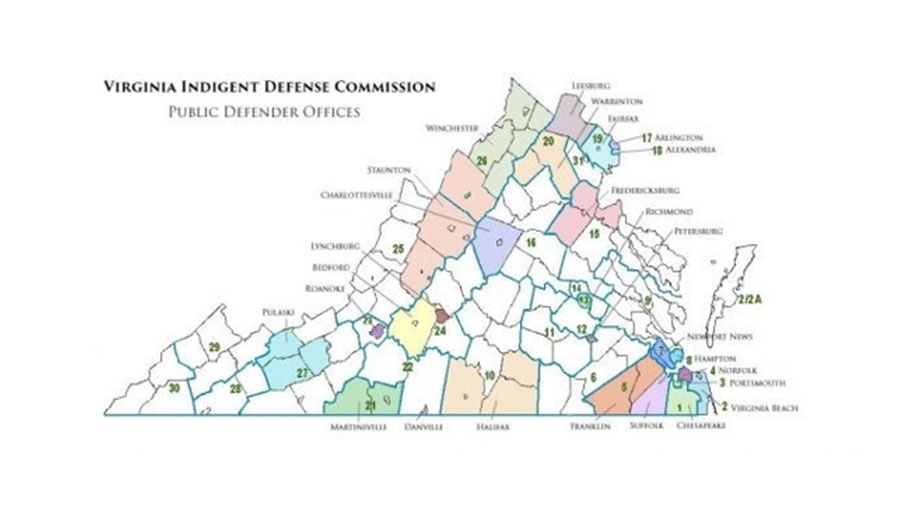Our legal system in the United States and here in Virginia is an adversarial system, built on the foundational proposition that truth and justice will prevail most often when two sides to a dispute do battle in the courtroom, submitting their best arguments to a judge or a jury who will then make a reasoned decision to resolve the case. The system assumes that both sides are capably and competently represented by their lawyers; in a criminal case, those lawyers are the prosecutor and the criminal defense attorney.
Within this adversarial system, the lawyers at Cook Attorneys in Harrisonburg defend our clients who have been accused of committing crimes. This article will discuss the role of a prosecutor in this system and in the prosecution of criminal cases in Virginia.
PROSECUTORS VS DEFENSE LAWYERS
The American Bar Association answers the question, “What is a prosecutor?” by saying that it is a prosecutor’s job to protect the innocent and seek justice within the bounds of the law.
A prosecutor is a lawyer who works to seek justice for the community.
Who is a prosecutor’s client?
If a prosecutor is operating ethically, their client is the public and not any government agency. They do not represent the members of law enforcement who have worked on the case. Just the same, their client is not the crime victim or the crime victim’s family.
Above all, the prosecutor is to remain motivated by justice for all members of the public, including the accused.
ARE PROSECUTORS ELECTED OR APPOINTED IN VIRGINIA?
In Virginia, prosecutors are constitutional officers elected by the people to be the Commonwealth’s Attorney. Each jurisdiction—that is, each county and independent city—elects the Commonwealth’s Attorney every four years.
For reasons of history, some Commonwealth’s Attorneys are elected by combined jurisdictions; for example, Harrisonburg and Rockingham County in Virginia elect a single chief prosecutor.
However, neighboring Augusta County elects a Commonwealth’s Attorney as do the cities of Waynesboro, VA and Staunton, VA which are located within the borders of Augusta County.
WHAT IS THE ROLE OF THE PROSECUTOR VS THAT OF DEFENSE ATTORNEYS?
The prosecutor’s role is to accuse the defendant with a specific crime or set of crimes. The prosecutor will then seek to prove beyond a reasonable doubt that the defendant is guilty.
The defense attorney’s role is to represent the accused individual or corporation, defending them against those charges. The defendant is innocent until proven guilty by the prosecutor’s evidence.
The Commonwealth’s Attorney serves as the attorney for the government in criminal prosecutions as well as in a limited number of civil and administrative proceedings.
The job of the prosecutor is to represent the interests of her client, the Commonwealth of Virginia, but—in addition—the prosecutor has special ethical duties beyond the ethical duties of other lawyers to see that justice is done.
The prosecutor, for example, cannot not continue to pursue a criminal charge that is not supported by probable cause.
The prosecutor cannot encourage anyone to withhold information from a criminal defense attorney, and the prosecutor has a duty to make timely disclosure of evidence which tends to negate the guilt of the accused, mitigate the degree of the offense, or reduce the punishment.
WHAT AUTHORITY DOES THE PROSECUTOR HAVE?
The Commonwealth’s Attorney cannot see herself as the attorney for the “victim” of a crime or for the police; the prosecutor’s client, ultimately, is Justice itself.
This is very important as the prosecutor is in fact the most powerful person in the courtroom and in the criminal justice system as a whole—more powerful even than the judge.
The prosecutor decides what accusations to make, and many charges currently carry minimum sentences, some mandatory, that can tie the hands of the judge or jury.
The vast majority of criminal cases—more than 90% of felony cases—end in a plea agreement, the terms of which are written by the prosecutor and merely accepted by the judge.
Clamoring in Harrisonburg and Rockingham County over recent years for changes in the criminal justice system and for a “criminal justice planner” is well-meaning but misguided; the criminal justice planner is the Commonwealth’s Attorney, and any desired changes by those currently seeking change in our local implementation of the criminal law can only be made by the Commonwealth’s Attorney (and, perhaps, to a lesser degree, our local judges).
ASSISTANT PROSECUTORS
Most Commonwealth’s Attorneys in Virginia hire one or more assistants to assist in the prosecution of criminal cases.
Here in Harrisonburg, our Commonwealth’s Attorney has a stable of approximately a dozen lawyers who are tasked to assist the Commonwealth’s Attorney in the prosecution of criminal offenses.
Most of our cases, then, are prosecuted by assistants rather than by the elected Commonwealth’s Attorney.
PUBLIC DEFENDERS IN VIRGINIA
Many jurisdictions in Virginia have a Public Defender’s Office which in some ways mirrors the Commonwealth’s Attorney’s Office.
However, the Public Defender is appointed by the Circuit Court (not elected by the people) and hires assistants to assist in the defense of indigent clients who cannot afford to hire a criminal defense lawyer. In Virginia, Public Defender’s offices usually have fewer lawyers and staff members than the Commonwealth’s Attorney’s office in the same jurisdiction, and the Public Defenders are given smaller budgets and paid lower salaries.
Not every jurisdiction in Virginia has a Public Defender’s Office. The Virginia Indigent Defense Commission has published the following map to show which jurisdiction is served by a Public Defender.
However, the map incorrectly identifies Harrisonburg and Rockingham County as a jurisdiction served by a Public Defender. Harrisonburg and Rockingham County does not yet have a Public Defender’s Office, but efforts are underway to establish an office in this jurisdiction. Currently, there is a list of more than 15 private lawyers in Harrisonburg who accept way-below-market wages from the court to represent the poor in our community. If a defendant is found guilty, those minimal legal fees are assessed to the defendant as court costs.
REQUESTING A COURT-APPOINTED ATTORNEY IN VIRGINIA
If you believe you need to request a court-appointed attorney, the judge will at your first appearance ask you to complete an affidavit listing your income, your assets, and your liabilities.
The General Assembly of Virginia has promulgated a table that the judge will consult to determine whether you qualify as “indigent” and, therefore, in need of a court-appointed attorney.
It is very acceptable and happens on many occasions that a person initially obtains a court-appointed attorney but after meeting with him contacts Cook Attorneys or another private lawyer to inquire about retaining counsel for his case.
If you are in this situation and choose to hire Cook Attorneys, we can contact your court-appointed attorney to let him know that we will be taking over the case and that he does not need to perform any additional work on the case.
We will also contact the court to let the clerk and the judge know that we are now representing you and that further correspondence or notifications from the court should be sent to you through us at Cook Attorneys.
LET US HOST YOU FOR A FREE CRIMINAL DEFENSE CONSULTATION
Whether you have requested a court-appointed attorney or not, our Harrisonburg VA criminal attorneys offer free initial consultations for most criminal defense clients.
You can learn more about what to expect from our free criminal defense consultations. When you’re looking for the best criminal lawyers in Virginia, it is a good idea to ask around and to shop around prior to hiring an attorney.
While self-representation is an option, it is often ill-advised because of the complexity of the legal system. It’s just not possible to duplicate the expertise that a criminal defense attorney can bring to your case.
Our team at Cook Attorneys in Harrisonburg hopes to have the opportunity to support you in ensuring the best possible outcome for your case. Please contact us to schedule an appointment today.
Fill out the form below to request more information about how we can serve you. Se habla español. We look forward to hearing from you!










